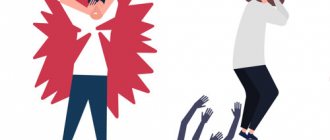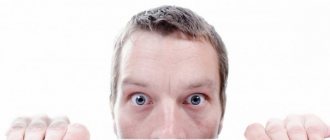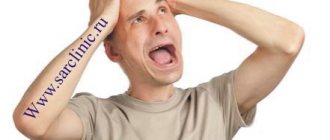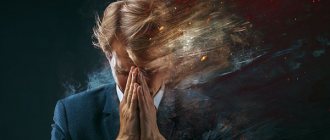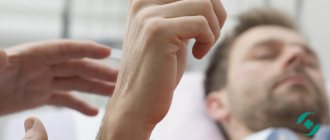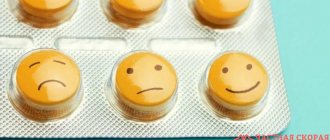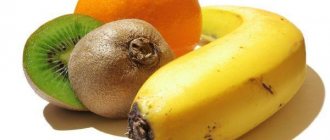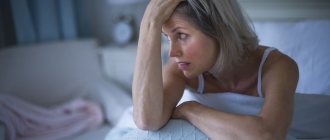Home>Articles>Panic attacks after alcohol
quick menu (hide)
- Causes of panic attacks
- Symptoms of occurrence
- Physical manifestations
- Treatment of panic attacks
- Aids
- Medications
- Sport as treatment
Panic attacks and alcohol - these factors are not at all inextricably linked. In some people, this condition is a consequence of taking minimal doses of alcohol (no more than 30 grams per day). This amount is considered by many people to be a simple antidepressant, due to its ability to stop the release of the anxiety hormone - adrenaline. But on the other hand, such a dose is poison, as it causes mental problems, provoking a conflict between the conscious and subconscious “I” of a person.
How does a panic attack form?
The only cause is the consumption of alcoholic beverages. Panic attacks after alcohol what to do? - only those people who have learned from an early age that alcohol is an antidepressant can ask such a question. The person sought to drink alcohol to stimulate positive emotions. But he will only receive:
- imbalance between the autonomic and sympathetic nervous systems,
- threat of delirium tremens
- and panic attacks.
The mechanism for the formation of the negative effects of psychoactive substances, which include alcohol, along with drugs, is quite simple. Ethanol can saturate the brain with dopamine. After which the nervous system is exhausted and its production weakens. for natural dopamine levels to return.
Those who drink alcohol regularly reduce dopamine levels to critical levels, which is a prerequisite for a panic attack.
Many people mistakenly perceive blocking dopamine antagonists with alcohol as a positive thing. A one-time release of dopamine momentarily immerses a person in euphoria and reduces the perception of anxiety and fear. In the absence of these feelings, the body triggers a reaction mechanism that ends in an attack.
Important!
A panic attack is an attack of inexplicable, severe fear. It is accompanied by a feeling of horror and elements of disruption of the autonomic nervous system.
Particularly severe attacks develop in a person with a hangover. This is a consequence of his poisoning with the destruction products of alcohol and standard experiences. A severe hangover attack causes wild fear in a person, increased adrenaline levels, and uncontrollable anxiety . In some cases, the attack is associated with the desire to quit drinking and justifying oneself for an unsuccessful attempt.
Originally Answered: Why do I have panic attacks after drinking alcohol? – simple. This is a disagreement between the desire to drink alcohol, which becomes a consequence of developing alcoholism, and the understanding that alcohol is poison. An anxious and suspicious personality makes the attack emotionally charged, causing increased fear.
Depressive states with a hangover
Depression from a hangover is manifested by painful experiences combined with incredible melancholy. The causes of depression that occurs after a hangover the next day are the following:
- the level of glucose in the blood sharply decreases, which causes muscle spasms and a general loss of strength;
- when alcohol enters the bloodstream, the nerve fibers first experience excitement, then a sharp inhibition occurs, which causes an uncomfortable state;
- with alcohol intoxication, there is no sober assessment of what is happening;
- redness of the skin from drinking alcohol;
- appetite disorders;
- changes in blood pressure;
- headaches after drinking;
- swelling of the face and limbs after drinking alcohol;
- feeling of heaviness in the stomach;
- desire to drink.
In severe conditions, in this case, clouding of consciousness occurs, accompanied by hallucinations, helplessness, and simultaneous psychological arousal. This is how panic develops after drinking alcohol.
Fighting alcohol depression
Having an understanding of hangover depression, it is important to choose the right options on how to deal with the problem. Professional help for panic attacks after a hangover consists of the following comprehensive measures:
- detoxification is necessary, which involves completely cleansing the body of alcohol breakdown products. Droppers with special medicinal compositions that neutralize the effects of decomposing ethanol are recommended. At the same time, liver cells are restored and brain activity is normalized;
- to overcome psychological discomfort, medications from the category of antidepressants that are not addictive are prescribed;
- After cleansing the blood and normalizing the nervous system, special sessions with a psychotherapist are indicated to help the patient adapt more quickly to society.
Acute depressive disorders are treated with strong tranquilizers, and special drugs are prescribed to help get rid of hallucinations.
You can avoid a hangover only by completely abstaining from alcohol, or with a moderate dose of alcohol. It must be remembered that even a moderate dose of alcohol can cause poisoning and subsequent mental disorder. Therefore, it is necessary to listen to the body’s reaction to various types of alcohol, and draw intelligent conclusions from this.
Video: How to get rid of depression after a hangover?
Symptoms
Panic attacks caused by alcohol initially do not manifest themselves in any way. Everything inside a person is boiling. The patient does not know where to go to relieve the condition. While physical pain can be relieved with medications, there is no way to cope .
Such attacks can be observed in people of a certain type:
- those suffering from hypochondria, afraid of injury, illness and infection,
- prone to hysteria
- suffering from obsessive ideas
- epileptics.
The possibility of an attack is higher in people who have congenital or acquired diseases of the heart and blood vessels as a result of drunkenness. Alcohol causes an increased fear of death . Everything goes in a circle: fear causes the synthesis of catecholamine, which leads to an attack.
Systematic alcohol abuse is the cause of pathologies of the endocrine apparatus. Adrenal tumors, thyrotoxicosis and alcohol abuse stimulate the release of adrenaline, which causes a panic attack.
Drinking alcohol causes abnormalities in the functioning of some internal organs, increases phobias, aggravates mental illnesses and depressive states. The short-term pleasure from drinking alcohol is replaced by:
- apathy,
- withdrawal into oneself,
- anxious observation of the inner world,
- fears of developing alarming symptoms.
What not to do and why
A panic attack after a hangover can trigger a cascade of actions that ultimately lead to the death of the patient. There is a list of things that are strictly prohibited from doing after drinking alcohol, so as not to worsen your condition. These include:
- a ban on the use of Aspirin and Paracetamol, as these drugs can provoke the onset of internal bleeding;
- a ban on the use of Phenazepam, since this drug becomes toxic when combined with alcohol;
- you cannot fight a hangover by drinking alcohol again, as this can provoke the development of poisoning;
- After a hangover, it is forbidden to visit the sauna or bathhouse for some time, as the heart may not withstand the increased load.
Often the patient considers it vital to take one or another drug to combat anxiety..
No matter how strong the feeling of death is, it is recommended not to take medications against the background of alcohol intoxication in the body. In this case, it is best to seek help from doctors so that they not only relieve the symptoms of intoxication, but also decide whether the person needs additional help in treating any chronic diseases.
Panic attacks while drinking alcohol are not uncommon, so you need to clearly understand what you can do if such a condition suddenly develops!
(Visited 456 times, 2 visits today)
What is a severe hangover? This question can only be answered by a person who has managed to survive the terrible condition. To the general symptoms: nausea, weakness, tremors, migraines, fever, other equally dangerous sensations are added. One of them has a very specific name - panic attacks. If you drink too much alcohol, but there are no plans to “continue the banquet” the next day, such a hangover, as a rule, is easily tolerated, with the exception of isolated cases. But when the holidays drag on and are accompanied by endless drinking, when coming out of a binge, a person who has been on a spree may feel extremely unpleasant feelings - panic attacks from a long hangover.
Citizens who are accustomed to drinking alcohol are divided into several categories, depending on how they understand friendship with alcohol. Normal people who have a neutral attitude towards alcoholic beverages are accustomed to drinking high-quality, good alcohol to relieve the nervous system, improve their tone or mood. Some drink it extremely rarely, exclusively on major holidays, others often, but even if they drink every day, their daily norm borders on understanding the problem of alcoholism.
They are not afraid of waking up on the street or being woken up by police in the subway or at a bus stop, they do not suffer from a hangover, and they do not cure themselves with a glass of beer the next morning. Such people have developed a strong belief that they need to drink in moderation. They don’t complain about terrible headaches when they’re hangovers, nausea from taking yesterday’s dose of alcohol rarely haunts them, and even more so, they don’t know the feeling of fear from a wild hangover. However, not everyone who drinks can boast of iron willpower.
Another caste of citizens, the most numerous, refers to alcoholic beverages as “YOU”. For them, alcohol consumption is associated with almost all official holidays. If a person who is used to drinking for reasons has a strong character, he is able to stop after any red day of the calendar. But there are also those who strive with all their might to prolong the holiday of the soul, and then the severe consequences of a prolonged hangover cannot be avoided.
You will still have to give up drinking alcohol, but at what cost. Medical practice knows many examples when, after prolonged alcoholic libations, people went crazy. There are frequent cases of mental exacerbations and delirium tremens. Panic attacks in this vein are also a direct consequence of excessive and prolonged drinking. With a hangover, an alcoholic is accompanied every day by:
- feeling of death;
- he has nightmares;
- he feels a state of something inevitable and terrible;
- flinches at the slightest sound.
And such a period after a long binge can last several days. How dangerous is it and how is it related to health?
Physical manifestations of panic attacks
Before a person feels an attack of overwhelming fear, he experiences:
- dry mouth,
- lump in throat
- lack of air,
- increased sweating,
- chills,
- numbness of hands and feet,
- frequent urge to urinate.
The symptoms of the onset of an attack vary from person to person. There may be fear of death, madness, severe anxiety, an incessant feeling of tension, and increased blood pressure. Fainting also .
Attacks are not excluded in people with reduced immunity. Alcohol is a carcinogen that can disrupt the human immune system.
Signs of attacks after drinking alcohol do not have two components:
- presence of intoxication,
- vegetative-vascular disorders.
The second component is characterized by extensive symptoms, including a nonspecific complex - damage to the gastrointestinal tract, respiratory organs, heart and blood vessels, and genitourinary area. cannot be detected during examinations . Doctors attribute this to a high level of anxiety, which is the impetus for the appearance of symptoms.
Treatment of panic attacks after alcohol
It will not be possible to eliminate an attack that has already begun on your own. There are no magic cures for this disease. Taking antidepressants, physical activity, massage - all this is not serious. The main thing for a person prone to attacks is to work on himself.
First you need to give up alcohol. If a panic attack was observed after each dose, it means that alcohol in any quantity and for any reason is prohibited .
It has been noticed that the more a person strives to get rid of attacks, the higher their strength and frequency.
Symptoms of the disorder
The main symptoms of depression after drinking strong drinks are similar to the symptoms of regular depression:
- Decline in mood (can be slight or severe, depending on the general condition before the feast);
- Depressed state;
- Sleep disturbance (long bedtime, frequent unexplained awakenings at night, shallow sleep, daytime sleepiness);
- Apathetic behavior, inhibited actions;
- Reluctance to perform even basic actions;
- Self-flagellation;
- Panic attacks, anxiety for no reason;
- Difficulty concentrating;
- Feeling of the meaninglessness of life and one’s actions;
- Suicidal thoughts (in case of severe depression);
- The presence of guilt;
- Appetite disturbances (means both its complete or partial absence, and its immoderation);
- Excessive irritability.
All of the above can be observed together, or there may be just a few symptoms. But if they do not go away on their own, then it is necessary to limit (preferably completely) alcohol consumption and consult a specialist.
Aids
The following are well suited as aids to help reduce the power of attacks:
- Taking vitamin-mineral complexes (injections of vitamins B and C),
- Accelerating the removal of alcohol breakdown products from the body - taking sufficient quantities of water, juices, fruit drinks, etc.
- Breathing exercises.
- Any water procedures, including contrast showers.
This list can be supplemented independently by including everything that can evoke positive emotions in a person and reduce the level of anxiety. You can't try to reduce anxiety by drinking alcohol. This will only increase the attack.
Medicines
There are no medications that can completely get rid of attacks. You should not take painkillers, antivirals or other medications and think that they will relieve a person from attacks. Seizures are not a disease and cannot be cured by taking a pill.
There are medications that can suppress anxiety, reducing the symptoms of panic. You can use folk remedies - soothing decoctions of medicinal herbs.
You can take medications only under the supervision of a doctor - a neurologist or psychotherapist.
The list of medications that a doctor can prescribe includes:
- sedative (based on plant components - valerian, motherwort),
- a tranquilizer, anxiolytic or a synthetic broad-spectrum agent (phenazepam, afobazole, seduxen).
But addiction to medications quickly develops. The doctor may prescribe an adrenergic blocker. But all these remedies are not a panacea. They don't always help. Rather, they are designed to save others from possible manifestations of unmotivated aggressiveness on the part of people susceptible to attacks. Medicines help keep the patient either in a state of semi-asleep or in a very relaxed state. At the same time, the person is conscious. The fear of not being able to gather oneself and physically respond to an ever-increasing threat can only intensify the manifestation of panic.
Medicines can only be taken in a state of absolute sobriety. Otherwise, the combination of alcohol and sedatives may cause unpredictable reactions. To the point where the person falls into a coma.
How to get rid of fear
How to remove anxiety, fear and anxiety during a hangover? There are many quite effective ways to get rid of such symptoms. The approach to elimination will depend on the root cause of such unpleasant manifestations. Since the main factor of psycho-emotional discomfort is alcohol intoxication, the first task when it occurs is to detoxify the body. For this:
- you need to drink as many drinks as possible like mineral water, plain water, chamomile infusion, green tea with mint or honey, etc. You need to drink at least 3-4 liters of liquid per day;
- you need to take any hangover medication, but just make sure there are no contraindications;
- take ascorbic acid. These can be dragees or effervescent tablets; if they are not available, you can eat lemon;
- It is recommended to take a cool, refreshing shower.
Such simple actions will make you feel better; with the removal of toxins, the patient’s condition will noticeably improve, and the psychological background will stabilize. You just need to understand that the emotional state is now associated with the body’s reaction to alcohol intoxication. You just need to get over it when the hangover goes away and your emotional background is restored. And for the future, it’s worth considering that it’s better not to get carried away with alcohol, because panic attacks can only get worse.
If a person was in a state of nervous overstrain or stress and decided to get rid of it with the help of alcohol, then it is worth remembering such an unpleasant reaction and no longer struggling with difficulties through strong drinks.
In such a situation, detoxification according to the scenario described above will also help relieve anxiety. You need to learn to switch attention from your difficult mental well-being to more detached things, for example, watch a light comedy, read your favorite book, take a walk in the park, etc. The main thing is not to focus on problems, so don’t be alone with yourself, let a dear person be nearby , you can even invite a group of friends, but only without gatherings with alcohol. Switch your thoughts from problems to more pleasant things - think about children or a loved one, career achievements, etc. Anyone can make a mistake, so you don’t need to reproach yourself for what happened, because it can be worse. Try to find something good in your problem, because in any situation, even the most stalemate, there are positive aspects. If psychological difficulties arise, then after getting rid of a hangover, you can use the services of a psychologist, or solve the pressing problem yourself. If panic and anxiety arose against the background of not entirely acceptable behavior during a party, then the problem here is completely solvable
First you need to get rid of a hangover by carrying out detoxification measures. If you don't remember what happened the day before, try contacting those who were with you in the evening. At least someone will help restore the chronology of yesterday's events. If there was nothing unacceptable, then there is nothing to reproach yourself for. Although such failures are not a good symptom that requires attention
If panic and anxiety arose against the background of not entirely acceptable behavior during a party, then the problem here is completely solvable. First you need to get rid of a hangover by carrying out detoxification measures. If you don't remember what happened the day before, try contacting those who were with you in the evening. At least someone will help restore the chronology of yesterday's events. If there was nothing unacceptable, then there is nothing to reproach yourself for. Although such failures are not a good symptom that requires attention.
If it turns out that your actions were not completely unacceptable, then immediately after getting rid of the hangover you need to contact or meet with all the participants in yesterday's event and apologize. Just don’t make excuses or humiliate yourself, just show that you are sorry and that the current situation is very unpleasant for you. For yourself, note how morally difficult this is and in the future try to avoid such incidents.
If panic attacks often occur due to a hangover, you should seriously think about giving up alcohol, because such a reaction indicates a developing addiction and the inability of the psyche to withstand the effects of alcohol.
Sport as treatment
Physical activity is an excellent opportunity to stop drinking alcohol and eliminate panic. Any available type of is welcome, from swimming and yoga to cycling, running, Nordic walking, skating or skiing. Physical activity helps a person:
- relax,
- eliminate nervous tension,
- relieve anxiety.
Physical education can improve the functioning of the endocrine system, increase dopamine levels, and enhance good mood.
If the attack catches a person at home, then breathing exercises will help reduce its manifestations. It helps stabilize the condition. Relieve tension, regulate the level of carbon dioxide in the blood. There is no need to breathe particularly quickly or deeply. Hyperventilating the lungs can only worsen the condition. Folding your palms and bringing them to your lips will help you come to your senses. Inhale in counts of 4, and exhale in counts of 6. This will increase the level of carbon dioxide in the blood and help trigger the parasympathetic nervous system. Which promotes relaxation.
If all else fails, you must call an ambulance.
Hangover. How to get rid of it?
How to help a poor body relieve a serious condition - a hangover? In order to relieve a hangover, treatment should be based on an understanding of the mechanisms of action of alcohol on the human body.
Detoxification
The main cause of a hangover – intoxication of the body – can be dealt with in different ways. The first method is the physical removal of poisons. An enema and gastric lavage help to do this. If these methods are unacceptable for some reason, you can take pharmaceutical sorbents - activated carbon or lignin-based preparations (Lignosorb, Liferan, Polyphepan). It is recommended to take these medications 3 times a day. spoons 2 times a day after 2 hours, washed down with 1.5 glasses of water.
Of course, our body is capable of getting rid of poisons on its own, but there are some hangover medications that will help do this faster. The following remedies can be taken:
- Succinic acid – 1 tablet every hour, but not more than 6 tablets;
- Eleutherococcus tincture - 20-40 drops before meals, if you need to raise your tone;
- Juice of 2 lemons, diluted with water in proportions 1:1, and honey.
A good hangover cure is kvass, as well as fermented milk products. Cucumber or cabbage pickle helps normalize the water-salt balance in the body during a hangover. Detoxification of the body in case of alcohol poisoning is accelerated by a contrast shower or bath, bathhouse and sauna. They are also the main means to eliminate another cause of a hangover - dehydration.
Elimination of dehydration
What helps with a hangover, particularly dehydration? To properly redistribute fluid, you can resort to one trick - simultaneous intake of fluid and a diuretic, for example, water and non-alcoholic beer or natural coffee. But before using this method, you should definitely replenish the body with electrolyte salts - drink cucumber or cabbage pickle, mineral water or oat decoction.
Normalization of the nervous system
When the removal of toxins and redistribution of fluid in the body is completed, you can begin to restore the nervous system. What to drink for a hangover for these purposes? The best remedy for restoring the nervous system after alcohol intoxication is glycine. It is taken every hour, you need to place the tablet under the tongue or behind the cheek - up to 5 times a day. Glycine is a component of gelatin, which suggests that jellied meat is the best snack when drinking alcohol, just like fish soup, jellied fish and jelly.
The following tablets will help with a hangover: “Picamilon”, “Panangin”, “Mexidol”, “Pantogam”. In addition to tablets, you can use natural products for these purposes - milk and “live” beer (or non-alcoholic). You can take hangover pills or Enetrosgel, which intensively removes alcohol breakdown products from the body that cause discomfort. This drug is recommended to be taken in the evening after a feast and the next morning - 3 tablets. spoons. It is better to drink Enterosgel with non-carbonated mineral water.
How to survive a hangover? If it is possible to stay at home after all the above procedures, go to bed. Prolonged sleep will help overcome even a severe hangover. If you need to go to work or other errands, drink an energy drink - natural coffee, strong tea, or any pharmaceutical hangover remedy. A hangover after beer is relieved in the same way as after vodka or wine.
